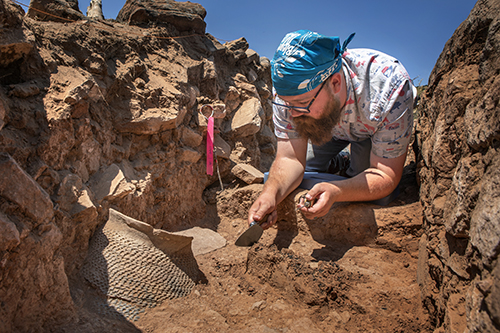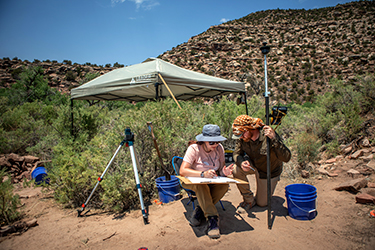WSU Students Study Archaeology in Southeast Utah
OGDEN, Utah – A group of Weber State University students are spending part of their summer exploring Coal Bed Village; an ancestral Puebloan habitation center in southeast Utah. Instructors are guiding students in the excavation and analysis of an “amazing” archaeological site as part of WSU’s Study Abroad program, July 5-31.

Student Alex Willie
Over the past few years, Weber State has led student groups in mapping the large prehistoric community, 10 miles east of Blanding, Utah, that was occupied approximately 1,000 years ago. This year, the group will continue excavating a ceremonial underground room called a kiva. Each year, thousands of artifacts such as pot shards, stone tools and animal bones are recovered from the site.
“Southeast Utah is a beautiful location with thousands of years of prehistory,” said David Yoder, WSU anthropology professor, who has excavated more than 40 sites throughout Utah. “The area has a high density of unique and amazing archaeological sites. This trip is a great opportunity to train and educate students in archaeological field techniques while performing excavation and research.”
The group has been working to excavate this particular kiva for three years. Each year, the team painstakingly digs through sand and rock to uncover the structure, fastidiously recording everything they find, even rock placement, and the measurements of the site. Once they have safely uncovered as much as possible and recorded all the necessary information, the site will be backfilled to preserve the area. The team is working on the assumption that this is the only time this site will be examined.
Weber State has hosted the archaeological trip each summer for more than 30 years. Last year, the trip was canceled due to the pandemic, but the group is excited to continue their work this year.
“So much can be lost in the past, so it’s important to document these places while we still can,” said Shawn McGrath, an anthropology major with an emphasis in archaeology. “Every little bit we discover helps contribute to the bigger story. It pulls everything together and helps us understand what these ancient cultures were like.”
Students will learn how to excavate archaeological sites, recover artifacts and document architecture and other features. Additionally, they will learn how to perform pedestrian surveys, which involve carefully walking through the chosen area to find and record previously undiscovered sites.
 “This is where you learn how to put the procedures and tactics you’re taught in the classroom to use,” McGrath said. “It takes a lot of patience, especially when you’re digging artifacts out from the site, but it helps us build a historical record of what may have taken place. It really ties everything together.”
“This is where you learn how to put the procedures and tactics you’re taught in the classroom to use,” McGrath said. “It takes a lot of patience, especially when you’re digging artifacts out from the site, but it helps us build a historical record of what may have taken place. It really ties everything together.”
The trip offers an immersive, collaborative experience that gives students a chance to learn what the life of an archaeologist looks like. Students spend each week camping near the site, excavating and recovering artifacts during the day and socializing with their peers in the evenings. They return home on the weekends.
Faculty and students from Brigham Young University and the University of New Mexico have joined the group from Weber State, giving participants an opportunity to learn and collaborate with others in their field.
Students who participate in the program can register for up to six anthropology credits through Weber State University. They can also earn a certificate or an associate’s as an archaeological technician in the College of Social & Behavioral Sciences. To learn more, visit weber.edu/socanthro/anthropology.
This is the first year the trip is being offered as part of WSU’s Study Abroad program. Study Abroad traditionally hosts a variety of educational trips each year to locations all over the world. Last year, COVID-19 forced them to cancel many of their programs, but they hope to offer more trips this year as safety measures allow. The program immerses students in the culture and environment of different regions to enrich their education and broaden their worldview. For more information about Study Abroad, visit weber.edu/studyabroad.
For photos, visit this link.
Visit weber.edu/wsutoday for more news about Weber State University.
Shaylee Stevens, Office of Marketing & Communications
801-626-7948 • shayleestevens@weber.edu- Contact:
Allison Barlow Hess, Public Relations director
801-626-7948 • ahess@weber.edu